From The Heart Of Kosovo: Interview with Jamie Donoughue, Oscar nominated Director.
Jamie Donoughue is an Oscar-nominated British film director, producer and writer. He is best known for directing short-film Shok that earned him critical appraisal and multiple international awards including Academy Award for Best Live Action Short Film nomination at the 88th Academy Awards. In 2016, he directed two episodes of the critically acclaimed BBC / Netflix drama The Last Kingdom. Here is an interview with Jamie, focusing on his moving short film, Shok.
[This interview was originally published by the Red Elephant Foundation and can be read here]
Could you start by telling us a little about yourself? Your growing years, education and professional trajectory, perhaps?
Ever since I was young my true passion was actually Judo and for many years this is what I wanted to do professionally. The first bit of filming I ever did was to film a local Judo contest and I guess this is where I got the bug. After finishing school I worked for a production company in my year out and then went to University to study TV & Film. During this time I worked at a local TV station, camera operating and directing. After leaving Uni I set up a production company making music videos. We were fortunate to grow quickly and had a lot of success working with some incredible artists around the world. However, my true passion was always in drama. So after a (very early) midlife crisis, I decided to move in that direction, starting with my first short film ‘Shok’. Shok has since provided me many incredible opportunities. I have just finished directing on season 2 of the BBC/Netflix Drama ‘The Last Kingdom’ and am currently in development of my own TV show with NBC Universal.
What inspired Shok?
Back in 2010 I randomly visited Kosovo to shoot a commercial as a favor for a friend. It was planned as a three-day trip. Then the Icelandic Volcano erupted and I found myself stranded there for five weeks. I say ‘stranded’ but the truth was it was the most incredible time of my life; I didn’t want to go home. I met some amazing friends and was overwhelmed by the generosity and hospitality of the Kosovar people. Over time they began to tell me their stories and I could not believe what had happened less than ten years ago on my doorstep. It’s only when a person looks you in the eye and tells you their story that you fully understand the true meaning of the word ‘war’. What inspired me most, however, was that there was no anger, rather just a desperation for their stories to be heard. I wanted to give something back to them and tell as many people as possible about what I had learnt.
What kind of preparation went into dealing with something so nuanced and painful?
I knew very early on that I wanted to tell a true story based around people not events and most importantly relate to an audience by exploring the lives of the children during this time. One of the biggest challenges however was choosing what story to tell. Literally ever person in Kosovo had been affected by the war and each of their stories are as painful and inspiring as the next. One key story I landed on was of my good friend Eshref Durmishi. He survived the war and became an actor and actually ended up playing the part of his aggressor in film. My main concern however was to create a film that was true to the people of Kosovo, but yet appeal to an international audience. I did not ever want to be seen as a foreigner coming over and ‘using’ the country for its stories. The only way to overcome this was to truly understand the culture and the people. I therefore spent the next four years learning and researching everything possible about the country. I stayed with many families, meeting and interviewing hundreds of people. I ate, drank and lived Kosovo, even learning the language (granted very badly). Only after all this did I feel the time was right and I could represent them in the most honest and respectful way.
It was an extremely difficult and logistically problematic to get us to the production stage. No one in the UK wanted to fund us and producing a coproduction between the two countries was not easy. I have to thank my amazing producers Harvey Ascott and Howard Dawson for making it possible. However, once we actually got to the stage of filming it was an incredible experience. I had a mixture of UK and Kosovo crew and everyone involved had either been directly affected by the war or had spent time in Kosovo to truly understand what we were trying to achieve. The film had many difficult scenes but the truth is we kept the shoot light hearted and most importantly for me was that we all had fun. We were attempting something that had not really been done before and most people were working for very little money. It was a passion project for everyone. However, one particular scene will stay with me for the rest of my life. When filming the raid on the house I first ran a rehearsal with just the actors in order to work out the camera movement I wanted. The entire crew plus the hundred or so onlookers were outside waiting. We rehearsed the raid of the house and removal of the family. I was in the midst of it and it was so real I was physically shaking. I walked outside to find everyone else in tears, traumatized from hearing the sounds alone. It was at that point I questioned everything I was doing and whether I was wrong to be playing with people’s emotions in this way. Then the neighbor from upstairs came over. She too was in tears. She said to me that the exact raid had happened here in that property. She then told me as and hard as it was to believe she wanted to thank us all for taking on this story and enabling others to know the truth of what had happened.
What have your biggest challenges been? How have you dealt with them?
Trying to make it in the Film & TV industry is incredibly hard. People always tell you this but you have no idea. Probably my biggest challenge was after leaving my company. I had spent years building it up and now had to start again from scratch. I risked everything on making Shok and put every last penny I had into the project. I had to take a job with a friend laboring on building sites. In fact I found out I have been long-listed for an Oscar whilst constructing a garden shed. All this was great training though. It allowed me to stay humble and realise patience, persistence and hard work is key. Also that once in a while it’s good to take a risk.
As a filmmaker, you are a storyteller who takes fact out into the world through an observer’s lens. When you deal with difficult subjects, how do you retain your objectivity?
Normally with Film or TV there is an understanding of using ‘creative licence’ i.e. manipulating facts and reality in order to benefit and enhance the story. However with Shok this was not something I ever wanted to do. These were people’s lives, and indeed deaths. The film dealt with war and atrocities and by its nature could appear extremely one sided. I was therefore very conscious of keeping my objectivity. I spent time in all other areas of the Balkans including Serbia, speaking to locals and hearing their experiences. I learnt that the truth is war is complicated and dirty and there is rarely a simple answer to who is right and wrong. However this film was never about the ‘events’; it was about the people and the true victims of war, whoever they are and wherever they are from.
You’ve been the voice of those that are otherwise not heard, considering how information on the situation in Kosovo is relegated only to a statistic. How does that feel?
When I set out to make this film I gave myself an objective; if just one person watches this film and decides to find out more about Kosovo then it will have been worthwhile. We have been incredibly fortunate that due to the success of this film Kosovo has been put on the world map. As well as its nomination for an Oscar®, over a million people have see the film along with vast international press exposure. We have done Q&A’s across the world, presentations in schools, been discussed at the United Nations, met the Royal Family and even our two child actors were invited by the Pope to perform at the Vatican for the consecration of Mother Teressa. This is not only proof of the power of film but also the power of people. How do I feel? Honoured, humbled and extremely grateful. It’s incredible to think that although Shok highlights the negativities in this world, its success has highlighted the positives.
What goes into making your creative process what it is? What inspires you?
I spend a lot of time researching a subject and finding out as much as possible. It’s about the little details that you put into a film. Grated many of the audience may not pick up on these but overall it creates a richer and more impacting viewing experience. I have a clear idea of what I want but at the same time I realise most of the creativity is done ‘in the moment’. I like to empower the actors and crew and all work together to create something unique. For me inspiration can come from anywhere but I guess I am mostly drawn to true stories. This is especially the case if the subjects of these stories are still alive and I am able to talk with them. I think we have become desensitized to war and violence. Words such as refugees, displacement, famine, etc have become just that… words. I like to try bring meaning back to this by putting a face and personal story to these events. If an audience can relate to it then they can see in fact we are all actually not too dissimilar.
—
More on the film
Twitter – @shokshortfilm

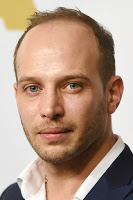
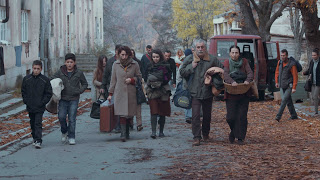
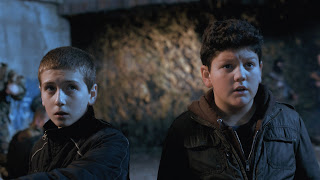

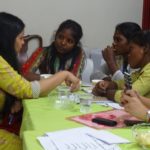
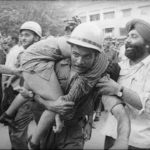
Leave a Reply